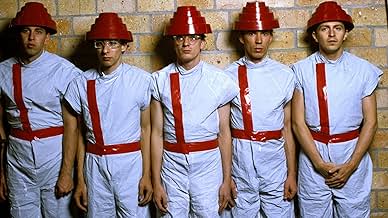Devo
- 2024
- 1h 34m
In 1980, new wave band Devo scored a hit with "Whip It" and gained mainstream success with their message of societal "de-evolution", formed in response to the 1970 Kent State shootings.In 1980, new wave band Devo scored a hit with "Whip It" and gained mainstream success with their message of societal "de-evolution", formed in response to the 1970 Kent State shootings.In 1980, new wave band Devo scored a hit with "Whip It" and gained mainstream success with their message of societal "de-evolution", formed in response to the 1970 Kent State shootings.
- Awards
- 1 win & 1 nomination total
Gerald Casale
- Self - Devo
- (as Jerry Casale)
Robert Mothersbaugh
- Self - Devo
- (as Bob Mothersbaugh)
Bob Casale
- Self - Devo
- (archive footage)
- (voice)
Jim Mothersbaugh
- Self - Devo
- (archive footage)
Alan Myers
- Self - Devo
- (archive footage)
- (voice)
Elliot Roberts
- Self - Devo's Manager
- (archive footage)
John F. Kennedy
- Self - 35th President of the United States
- (archive footage)
Richard Nixon
- Self - 37th President of the United States
- (archive footage)
Jimmy Carter
- Self - 39th President of the United States
- (archive footage)
Ronald Reagan
- Self - 40th President of the United States
- (archive footage)
Allison Krause
- Self - Killed at Kent State Anti-War Protest
- (archive footage)
Jeffrey Miller
- Self - Killed at Kent State Anti-War Protest
- (archive footage)
Bob Lewis
- Self - Early Collaborator
- (archive footage)
- (voice)
Ernest Angley
- Self - Christian Evangelist
- (archive footage)
David Bowie
- Self - Singer-Songwriter
- (archive footage)
Richard Branson
- Self - Entrepreneur
- (archive footage)
Featured reviews
Devo was a fun, adventurous band with a talent for mixing innovative sounds and vision with a commercial appeal that spread across a tumultuous decade or so.
Devo's catalog is rich and tuneful, despite the surface weirdness. The band wasn't just keenly talented musically, they brought a wit and an intellectual heft that was sorely needed in the music industry.
Casale seems to be the genius behind it all with Mothersbaugh right up there. But it's Casale's and Motherbaugh's never-ending complaining about the commercialization of the music industry and how Devo were poor, innocent lambs, victims of not just the piranha-like music industry but of America itself that disappointed me.
It's obvious Devo were masters at commercializing their product, even placing marketing/product paraphernalia inside albums. Instead of being the victims of commercialization, Devo were experts at sucking out the money from everything they touched/touch.
Funny that they whine so much while both Casale and Mothersbaugh continue to become richer and richer in the film industry while the legend of Devo continues to grow.
A fine documentary, as enjoyable as the band, but Devo sometimes come across today as too 21st century, too privileged and entitled with wealth, reminding one of Trump or Musk, playing the victim while enriching themselves.
Devo's catalog is rich and tuneful, despite the surface weirdness. The band wasn't just keenly talented musically, they brought a wit and an intellectual heft that was sorely needed in the music industry.
Casale seems to be the genius behind it all with Mothersbaugh right up there. But it's Casale's and Motherbaugh's never-ending complaining about the commercialization of the music industry and how Devo were poor, innocent lambs, victims of not just the piranha-like music industry but of America itself that disappointed me.
It's obvious Devo were masters at commercializing their product, even placing marketing/product paraphernalia inside albums. Instead of being the victims of commercialization, Devo were experts at sucking out the money from everything they touched/touch.
Funny that they whine so much while both Casale and Mothersbaugh continue to become richer and richer in the film industry while the legend of Devo continues to grow.
A fine documentary, as enjoyable as the band, but Devo sometimes come across today as too 21st century, too privileged and entitled with wealth, reminding one of Trump or Musk, playing the victim while enriching themselves.
I learned a lot about Devo today, mainly how crazy they were! They had a plan and they stuck to it and became known around the world. Its a good thin MTV came along when it did or they may not have made it. Makes me want to get one of those plastic hair pieces. Satisfaction is a great video as well as Whip It, love that song.
DEVO (2025). Devo was one of the most innovative bands in rock history, but their very uniqueness became a double-edged sword for they were so ahead of their time, yet they were too often dismissed as a novelty act. Chris Smith's documentary does a good job tracing the origins and inevitable frustrations of the band. A sound clip in the opening montage describes them as "The Band Who Fell To Earth" - a clear reference to the David Bowie sci-fi film (a quite appropriate reference as Bowie would play a key role in launching the band).
Before they were even a band, Devo was an intellectual art project forged by twin events for the Ohio based artists. First, they were influenced by the outre theory of De-Evolution which included a pamphlet entitled "Jocko Homo" (credit much also go to Bob Lewis who was an early collaborator). Second, key members Jerry Casale and Mark Mothersbaugh were on campus and witnesses to the Kent State massacre in 1970. Add in a pinch of the classic horror film ISLAND OF LOST SOULS and what became Devo was born.
It took a few years, but Devo got seen and heard through their innovative short films which predated MTV and the music video revolution (which they became key contributors to). They made their way to NYC and got truly 'discovered' and noticed by the likes of John Lennon, Iggy Pop and Bowie (who eventually shephereded their first album in 1978 via Brian Eno). Even Mick Jagger got into the act as he personally signed off on Devo's first official single, a cover of "(Can't Get No) Satisfaction". Soon SNL called.
Smith's doc covers all of this in great detail and it makes up more than half of the running time. It's quite clear early on that Devo was never going to much more than a cult act. Their hit single "Whip It" also became a bit of an albatross as the record label kept demanding another hit (it was to be Devo's sole Top 40 record). Devo kept plugging away, touring, shooting videos, recording - rinse, repeat eventually putting out 8 albums during their initial incarnation.
In reality, by 1984 they had been somewhat abandoned by all but their most loyal fans and were dropped by their record label. Members began to quit (and sometimes come back), It may sound like a typical 'Behind The Music' career arc, but what what set the band apart was they never were really in it for the fame and fortune. They had a theory of man's de-evolutionary downward spiral and they preached and practiced it.
Devo may never get into the Rock Hall Of Fame although they've been nominated multiple times, but their experimental excellence endures. DEVO is a fine film tribute.
Before they were even a band, Devo was an intellectual art project forged by twin events for the Ohio based artists. First, they were influenced by the outre theory of De-Evolution which included a pamphlet entitled "Jocko Homo" (credit much also go to Bob Lewis who was an early collaborator). Second, key members Jerry Casale and Mark Mothersbaugh were on campus and witnesses to the Kent State massacre in 1970. Add in a pinch of the classic horror film ISLAND OF LOST SOULS and what became Devo was born.
It took a few years, but Devo got seen and heard through their innovative short films which predated MTV and the music video revolution (which they became key contributors to). They made their way to NYC and got truly 'discovered' and noticed by the likes of John Lennon, Iggy Pop and Bowie (who eventually shephereded their first album in 1978 via Brian Eno). Even Mick Jagger got into the act as he personally signed off on Devo's first official single, a cover of "(Can't Get No) Satisfaction". Soon SNL called.
Smith's doc covers all of this in great detail and it makes up more than half of the running time. It's quite clear early on that Devo was never going to much more than a cult act. Their hit single "Whip It" also became a bit of an albatross as the record label kept demanding another hit (it was to be Devo's sole Top 40 record). Devo kept plugging away, touring, shooting videos, recording - rinse, repeat eventually putting out 8 albums during their initial incarnation.
In reality, by 1984 they had been somewhat abandoned by all but their most loyal fans and were dropped by their record label. Members began to quit (and sometimes come back), It may sound like a typical 'Behind The Music' career arc, but what what set the band apart was they never were really in it for the fame and fortune. They had a theory of man's de-evolutionary downward spiral and they preached and practiced it.
Devo may never get into the Rock Hall Of Fame although they've been nominated multiple times, but their experimental excellence endures. DEVO is a fine film tribute.
Watched this at the 2024 Sundance Film Festival.
Chris Smith creator of "American Movie" creates a fun documentary about the band DEVO who are widely misunderstood with interesting choices of music, background observations and conversations. DEVO's background and story is pretty interesting as the documentary does a good job on exploring the band with some fun insights.
Since I am not the biggest music documentary person, I found certain aspects feeling slow and uneventful towards the second act. Including some of the conversations feeling a little dry. Overall, there are some really nice fun moments together.
Chris Smith creator of "American Movie" creates a fun documentary about the band DEVO who are widely misunderstood with interesting choices of music, background observations and conversations. DEVO's background and story is pretty interesting as the documentary does a good job on exploring the band with some fun insights.
Since I am not the biggest music documentary person, I found certain aspects feeling slow and uneventful towards the second act. Including some of the conversations feeling a little dry. Overall, there are some really nice fun moments together.
Weird, strange, quirky, futuristic, innovative and all out rockin', Devo was unlike any other. An oddball hodgepodge of bizarro literature, Experimental music, Sci-Fi garb and pointedly biting anti-American satire that extends all over the globe, this motley troublemaking geeks rode out a run of great music and striking visuals during their peak late 1970s - early 1980s run. Fueled by the Kent State Massacre (which some of the band members witnessed firsthand), a desire to be different visually and musically, a manifesto unflattering to the human species and Punk Rock, the Akron, Ohio spud boys became an unlikely success offering a very different slant to Popular Music at the time.
"DEVO" charts the surreal saga in characteristic fashion: colorful and over the top in its barrage of visuals comprising interviews with the band members (an impressively articulate Gerald Casale stands out) as they go toe to toe with snippets of live footage and a varied array of films and images from vintage reels to historical snapshots. The result is a cornucopia of sight and sound and great music.
For a band as fun and as eccentric the documentary strangely moves at a conventional and sedate pace at the first half. A lack of perspective ensues with a failure to give emphasis on the band's impact and influence on music and the entertainment industry as a whole. Also, the band members' careers after the band's heyday are given short mention which is a shame considering Mark Mothersbaugh and Gerald Casale pursued eclectic and quite interesting artistic endeavors. This is a doc that could have been another hour long.
Whether looking like aliens in janitor's uniforms or a bunch of nerdy autists in early 20th-Century swimwear, all topped by those memorable saucer-shaped hats, Devo, all robotically-synchronized stage movements and mainstream infiltration-subversion, and again, great music (re-listening to their songs I was struck how fresh and much better they sounded) left a distinct and enduring mark. A fine tribute to a brilliant band, this is one fans and Rock enthusiasts should see.
"DEVO" charts the surreal saga in characteristic fashion: colorful and over the top in its barrage of visuals comprising interviews with the band members (an impressively articulate Gerald Casale stands out) as they go toe to toe with snippets of live footage and a varied array of films and images from vintage reels to historical snapshots. The result is a cornucopia of sight and sound and great music.
For a band as fun and as eccentric the documentary strangely moves at a conventional and sedate pace at the first half. A lack of perspective ensues with a failure to give emphasis on the band's impact and influence on music and the entertainment industry as a whole. Also, the band members' careers after the band's heyday are given short mention which is a shame considering Mark Mothersbaugh and Gerald Casale pursued eclectic and quite interesting artistic endeavors. This is a doc that could have been another hour long.
Whether looking like aliens in janitor's uniforms or a bunch of nerdy autists in early 20th-Century swimwear, all topped by those memorable saucer-shaped hats, Devo, all robotically-synchronized stage movements and mainstream infiltration-subversion, and again, great music (re-listening to their songs I was struck how fresh and much better they sounded) left a distinct and enduring mark. A fine tribute to a brilliant band, this is one fans and Rock enthusiasts should see.
Did you know
- TriviaDevo (via Mark Mothersbaugh) earns approximately $1 million annually from "Uncontrollable Urge," thanks to its long-standing role as the theme for MTV's "Ridiculousness."
- Quotes
Mark Mothersbaugh: And after the set was over, Bowie came backstage, and he said he'd like to produce us. We're like, "Sounds good to us, because we're sleeping in an Econoline van tonight."
- ConnectionsFeatures Island of Lost Souls (1932)
- Soundtracks(I Can't Get No) Satisfaction
Performed by Devo
Details
- Release date
- Countries of origin
- Language
- Also known as
- Devo: La banda más incomprendida de EE.UU.
- Production companies
- See more company credits at IMDbPro
- Runtime
- 1h 34m(94 min)
- Color
Contribute to this page
Suggest an edit or add missing content








































